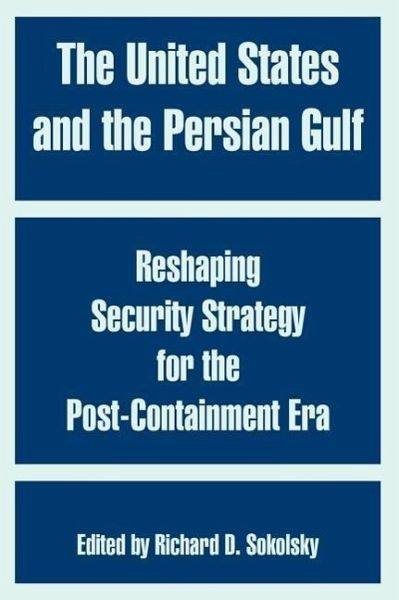
The United States and the Persian Gulf
Reshaping Security Strategy for the Post-Containment Era
Herausgeber: Sokolsky, Richard D
Versandkostenfrei!
Versandfertig in über 4 Wochen
16,99 €
inkl. MwSt.

PAYBACK Punkte
8 °P sammeln!
CONTENTS Preface Acknowledgments Introduction Richard D. Sokolsky U.S. Interests and Objectives Joseph McMillan Gulf Security Perceptions and Strategies Judith S. Yaphe The Regional Military Balance Kenneth M. Pollack U.S. Defense Strategy and Force Planning ss Richard L. Kugler The Role of Outside Powers Richard D. Sokolsky and Eugene B. Rumer Policy Implications and Recommendations Richard D. Sokolsky and Joseph McMillan About the Contributors As this book goes to press in early 2003, U.S.-led military action to eliminate Iraqi weapons of mass destruction and to create postwar conditions tha...
CONTENTS Preface Acknowledgments Introduction Richard D. Sokolsky U.S. Interests and Objectives Joseph McMillan Gulf Security Perceptions and Strategies Judith S. Yaphe The Regional Military Balance Kenneth M. Pollack U.S. Defense Strategy and Force Planning ss Richard L. Kugler The Role of Outside Powers Richard D. Sokolsky and Eugene B. Rumer Policy Implications and Recommendations Richard D. Sokolsky and Joseph McMillan About the Contributors As this book goes to press in early 2003, U.S.-led military action to eliminate Iraqi weapons of mass destruction and to create postwar conditions that could support democratic political development appears increasingly likely. However that operation unfolds, it will mark an end to the decade-long policy of containment of Iraq and set the stage for a new American approach to security cooperation and political engagement throughout the Persian Gulf. The chapters in this book offer a timely and sustainable roadmap for a new U.S. strategy and military posture in the region. The presence of U.S. forces in the Persian Gulf, particularly in Saudi Arabia, has been a highly contentious issue in the Arab world since the Persian Gulf War of 1991. While this presence gave the United States and its coalition partners new flexibility in containing Saddam Husayn, managing regional stability, and ensuring access to oil, it also exacerbated anti-American sentiment, particularly among the more devout and disaffected youth in the region. Removal of that presence and of the governments that allowed it became a rallying cry for Osama bin Laden and in the development of the terrorist jihad of a1 Qaeda. However, as contributors to this volume make clear, even in the absence of the new demands of the global war on terrorism, other regional political and strategic developments, as well as the erosion of international support for dual containment, warrant a reshaping of that military presence. Moreover, the continued transformation of U.S. military forces, including the enhancement of expeditionary and long-range power projection capabilities, could allow for a reduced forward presence in the Gulf. Managing such a transition will require a comprehensive regional strategy and reduction of the Iraqi threat to the region. Washington's scope for action will be greatly influenced by how military action against Iraq unfolds and what conclusions other countries in the region draw from it. But the contributors to this volume make a compelling case that regardless of the nature of regime change in Iraq, there are persuasive political and geostrategic reasons for the United S States to make major changes in its military posture and regional security strategy. Equally important, the contributors offer principles for effective promotion of the political and economic reforms that are essential to addressing the root causes of terrorism and many of the region's fundamental problems. Stephen J. Flanagan Director, Institute for National Strategic Studies and Vice President for Research National Defense University












